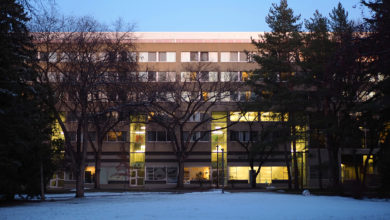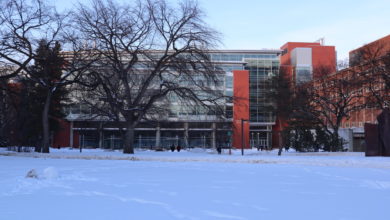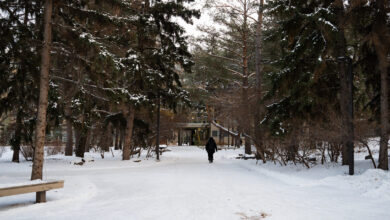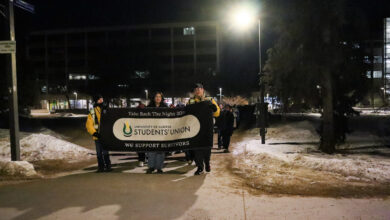SU Elections 2025 Q&A: Board of Governors representative
Two candidates are running to be the next Board of Governors representative — Karina Banerji and Angelina Raina.
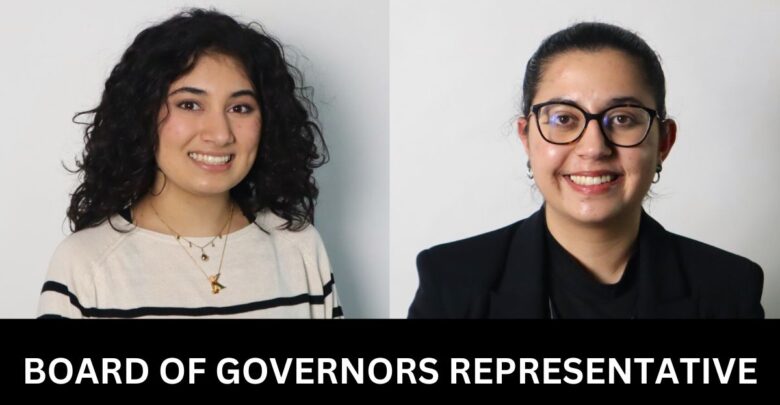 Gabriella Menezes
Gabriella Menezes The Board of Governors (BoG) is the highest governing body at the University of Alberta. BoG has seven standing committees and oversees the university’s property, finances, strategic direction, and overall operations. BoG members include the U of A’s president and vice-chancellor, faculty deans, and administrative staff.
The BoG representative holds a voting seat on BoG and represents undergraduate students at BoG meetings. This individual collaborates closely with the Students’ Union (SU) president, and participates as a voting member on both the Students’ Council and General Faculties Council (GFC).
There are two candidates in the 2025 SU BoG representative race:
- Karina Banerji, a third-year biological sciences and economics student
- Angelina Raina, a third-year political science and economics (combined honours) student, 2024–25 SU arts councillor, and GFC faculty of arts representative
The following interviews have been edited for brevity and clarity. Candidates were given 1 minute and 30 seconds to answer each question.
Why have you decided to run for BoG representative?
Karina Banerji: I’m quite involved in campus. I am [involved] in two faculties but also through a lot of student groups. I’ve definitely heard a lot more concerns from students in the past year. So I felt like I could help amplify those voices on a larger scale, because I am involved in these different things, and I’ve heard everyone’s different concerns.
Angelina Raina: Having spent the past year as an arts councillor, I now feel I have the experience in governance to navigate the structures with confidence. In any organization one joins, it takes time to figure out the strengths, weaknesses, and where you can push the boundaries of that role. So now, with that experience, and as a student, I’ve recognized the very real and visceral impact of the loss in trust with administration. I really wanted to run in this role because of my background in governance that I’ve had time to develop this year, and to really work to rebuild that relationship with administration.
There’s already an entire system to navigate, just to know where to voice which concern. That burden is already on the student. But now because of the breakdown of the relationship, I believe students aren’t under the impression that they’d even be supported if they were heard. That’s an impression that genuinely needs to change — it’s a matter of communication advocacy.
What would you say are the three main takeaways from your platform?
Banerji: Academics and affordability, accessibility, and protecting students rights. I know in the past year, politics have gotten quite polarized and a lot of students are scared, especially [transgender] athletes. I’m vice-president of the U of A fencing club, and I’ve definitely heard some concerns from our athletes [about] Bill 29. I think the BoG representative has a good place to amplify those voices. I’m also involved through the SU, Dewey’s, and [their] events, so I get a lot of student life inputs through those. I’ve heard some concerns that I think I can help with as well. On academics and affordability, there’s the first-day plan for textbook costs, which a lot of students are concerned about. I think I can help bring these more to the table and really help amplify the diverse student voices around campus.
Raina: I strongly believe we need to focus on holding the university accountable, be more imaginative about what the BoG role can be and what it entails, then continue to push engagement. With accountability, there’s a very legitimate breakdown in trust between students and admin. It, frankly, would be my responsibility if I was elected to rebuild that communication, to build those communication channels — especially in terms of campus safety.
I think there’s great potential to be very creative with the BoG role. It’s usually defined to be very passive, but the past two BoG [representatives] have been very engaged on campus. I want to carry on that momentum. [For] engagement, continue meeting with students and administration, that relationship building, continued use of the [anonymous survey] platform, and keeping that momentum going. I’d be part of the BoG board and the SU. I’d like to emphasize being a policy liaison between those two organizations and really making sure they’re on the same page. I think that’s something that can still be explored quite a bit.
Why would you be an effective advocate for students as BoG representative?
Banerji: I have a lot of experience in policy. I’m serving as a councillor representing third-years in my faculty association, the Interdepartmental Science Students Society (ISSS), which is one of the largest ones on campus. I’ve also been involved with the City of Edmonton Youth Council (CEYC) doing policy work there, helping amplify youth voices. I’ve heard the voices of incoming students to the ambassador program I’m involved with. I’ve understood and I hear the voices of students throughout different parts of campus, so I’m not concentrated in one spot. That, plus my experience, would be really helpful.
Raina: The key piece would be engagement. As I’ve learned from my predecessors, the boots on the ground approach is very valid. Increasing accessibility with the online platform that my predecessor championed. I’d carry on these values and lessons. What I’d like to bring to this role is my experience in advocacy as far as educating students goes. The initiative I’d like to bring to engaging the student population, is engaging them in an informed manner. Organizing teach-ins in collaboration with the SU execs and informing students on, what is the academic materials program if [they’re] being asked to vote on something, or what are these fees that you’re opting in and out of. That’s where I would like my efficiency to lie in the upcoming year. Organizing teach-in sessions and making sure people are engaged, but specifically in an informed matter.
BoG representative may be one of the positions that students are less familiar with. How do you plan on engaging with the student body regarding your work?
Banerji: The past two BoG representatives have done a really good job of that. They’ve really been trying to amp up the student voices, doing that through their social media work, which they’ve done a fantastic job of. But I always think there’s room for improvement. Engaging students is always a bit hard. Making sure everyone’s always up to date on what’s happening, so they have a really good understanding, is really important.
For social media, carrying on with [what’s been] done, but maybe doing weekly check-[ins], putting polls every week. [Asking], what would you like to hear, how can I do that, and working to implement that. But also engaging with the faculty associations between campuses. I know Augustana and Campus Saint-Jean (CSJ) are always underrepresented. So making sure we have constant communication and good relationships with those campuses as well, to make sure that those voices aren’t left behind like they often are.
Raina: I’d engage with them through the lens of treating their opinions on par with the administration’s. The burden of navigating the system is always on the students, but the anonymous platform has taken that off the students and pushed it more on administration. Perhaps advocating to the SU for some funding and resources for the BoG role itself, and aiding students in navigating that system, I think would very much increase engagement and make it more meaningful.
The BoG representative is responsible for raising student issues at university governance meetings and with people in high leadership positions at the U of A. How would you make sure that your advocacy reflects student issues at large and is effectively communicated to university leadership?
Banerji: Building off of what [the past two BoG representatives] have already done, especially with the [anonymous survey] website and getting those voices. There’s been concerns about how that might narrow down voices and how we filter that information. So also just going in-person to have those conversations with students one-on-one. Also making myself accessible to make sure I know exactly what they’re saying, not narrowing it down. But also taking time, understanding the issues, reading documents that we have to, to really put it into context. And figuring out how we can best frame this for the government and a way to support all students.
Raina: A tried and tested method that I’ve observed in university administration in that past — and within these formal governance structures in general — is student voices and personal stories. As impactful and meaningful as they are when it comes to relationship building, they’re not at the forefront [of] decision-making, which is unfortunate. I think that’s something that really needs to change, it’s valuing those personal stories and experiences.
Secondly, data. That’s something that’s been spearheaded by both the past two BoG reps. Whatever claim is being made, supporting it with data. With the past BoG [representative’s] survey platform, she herself collected that data. But also working as a policy liaison between the SU and the BoG. Really emphasizing that any decision [or] claim we’re making, and any advocacy we’re doing, is always grounded in those personal stories, and student voices, which is what would lead to the data.

